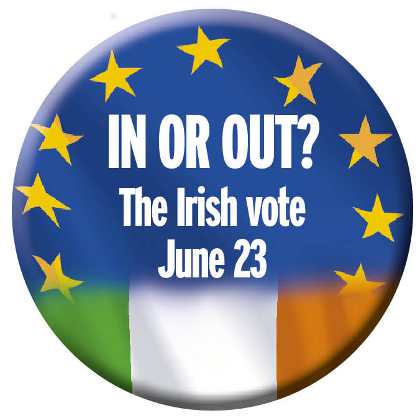IRELAND'S business and employers group has spoken of its concerns should Britain vote to exit the EU later this month.
When it comes to deciding if Britain should leave the European Union, Ibec claims there is a risk the debate will happen at local rather than national level, with people voting according to their needs and fears rather than the facts.
“It’s going to be a different world on June 24,” Ibec CEO Danny McCoy warned at an event being hosted by the organisation in London.
Also speaking at the Ibec Brexit gathering was Dawn Farms Chief Executive Larry Murrin.
Mr Murrin, a former Ibec president, started his Irish cooked meats business with just 12 people in 1984 and now has factories in Ireland and in Northampton, England.
“British influence has been growing in Europe over the last 10 years – the UK can be one of the most influential voices in the not too distant future,” he said.
Mr Murrin also spoke of how a Brexit might impact on the cost of trade between Ireland and Britain, in turn increasing the cost of goods.
“The British consumer is not prepared to pay more,” he added, citing the reintroduction of borders and customs controls as other concerns for businesses operating between the town nations.
Stressing the need for a stable political backdrop, Ibec has previously outlined what it believes will be a far-reaching impact on Ireland if Britain leaves the EU.
Ibec Director of EU and International Affairs Pat Ivory said: "Business is deeply concerned at recent polls that suggest the British vote on EU membership is too close to call.
“The size and economic scale of the UK means the stakes are very high, not just for the UK but for Ireland and the rest of Europe.”
He added: "A UK departure would be a blow to the Irish recovery and result in a protracted period of uncertainty for business.
"It would undermine Europe's ability to act collectively and decisively in the world and could push the EU back into a dangerous period of crisis management.”
Five ways Ibec claims a Brexit would impact on Ireland:
Undermine all-island economy
While the level of trade with the North of Ireland is less important than it used to be, any disruption to cross boarder commercial activity could have a very destabilising effect on the governance and economy of the North. Brexit would remove a shared economic, political and legal backdrop and could set back positive political and economic developments of recent years.
Trade disruption
A Brexit would result in years of uncertainty as Britain negotiates a new EU, involving higher costs for business. Ibec estimates trade flows between Ireland and Britain could fall by 20 per cent in a worst case scenario. Britain accounts for €2bn or 55 per cent of meat exports and €1bn or 30 per cent of dairy exports from Ireland.
Sterling devaluation
Already sterling has fallen significantly due to concerns over a possible EU departure. After a vote to leave, the sterling/euro exchange rate could weaken by a further 10 –15 per cent.
Investment uncertainty
The damaging economic effect of a Brexit and the risk of investment flight would likely prompt Britain to aggressively improve their FDI offering. Dublin could benefit if some corporate activity relocated from Britain to the EU, but on balance the risks outweigh any possible advantages.
Energy and Climate Change
Ireland shares a wholesale all-island electricity market and while the impact of a Brexit might appear benign it could impact on where stocks of liquid fuels are stored for security of supply reasons.


